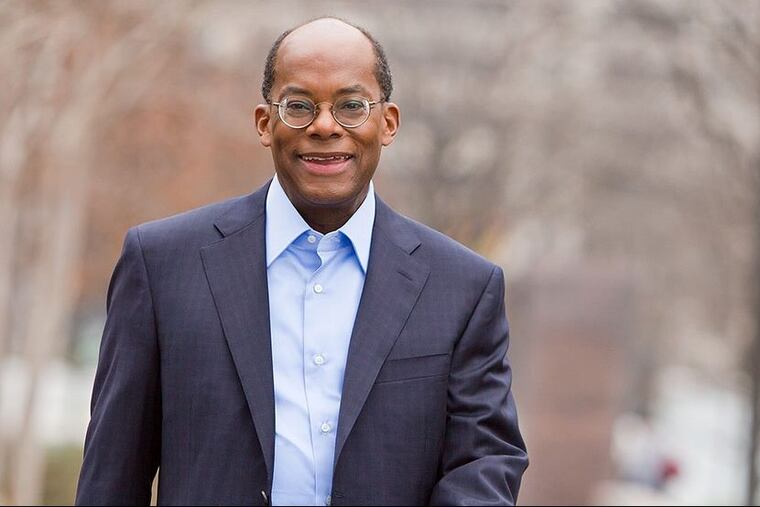Dear professor: TIAA, your annuity provider, was subpoenaed by N.Y. AG
A sit-down with TIAA chief executive Roger Ferguson in Philly, home to many TIAA clients - including the University of Pennsylvania, Temple, Drexel, St. Joe's, and scores of universities, colleges, higher education, and secondary schools in the region. TIAA is facing controversy over its sales practices.

The retirement and investment firm TIAA is under intense scrutiny now that a whistle-blower lawsuit has emerged alleging the annuities giant pushed higher-cost products to its clients — who work as or are retired academics, professors, and teachers.
So a sit-down with TIAA head Roger Ferguson was in order, since "eds and meds" capital Philadelphia is home to many TIAA clients — including the University of Pennsylvania, Temple, Drexel, St. Joe's, and scores of universities, colleges, independent secondary schools in the region, and as a retirement option for the Philadelphia School District.
What are the allegations? The New York state attorney general last week subpoenaed TIAA about whether its agents used fear tactics to push teachers and other clients into higher-priced products in exchange for bonuses.
It's a wake-up call for universities and academic institutions to examine whether they're upholding their fiduciary duty to shareholders — who are professors, teachers, and anyone who has access to TIAA annuities and other investments. FYI: Fiduciaries are required to act in the best interest of clients — rather than their own pocketbooks.
TIAA's chief executive Ferguson responded with this statement: "Our advisers are paid a salary plus an annual bonus, which is not based on the profit or revenue to TIAA that any product may deliver, but on neutral factors such as the time required to educate our clients on the benefits of more complex products." You can read their full response to the controversy, first raised in a New York Times article, at TIAA's website: www.tiaa.org under "News & Press."
While many academics remember TIAA when it operated as a nonprofit, it lost that tax status in 1997. So what was Ferguson's reaction to the subpoenas last week?
"The vast majority of our individual clients have observed that they have good, solid relationships with their advisers. Their experience with their advisers — which matters most — is consistent with our values, so I am not hearing from many of our individual clients around concerns triggered by that article," Ferguson said in an interview here, as he was about to be inducted into the American Philosophical Society.
But what do universities — known as institutional clients — say about the controversy? Are they reexamining doing business with TIAA?
"Our institutional clients are doing what they should be doing; which is asking the appropriate types of questions in their roles as plan sponsors, but again it is in the context of 'we've worked with you for a long time.' They're acting properly to hear our responses."
Ferguson said to the best of his knowledge, "we've not lost any institutional clients. It has not in any sense been a systemic challenge for us."
Has the incentive structure changed at TIAA as a result?
"No, not at this stage. Nothing's changed. We are a large and complex organization that's growing and evolving. But at this stage we haven't taken any concerted efforts to change anything."
TIAA competes with the Malvern-based mutual-fund giant Vanguard in the annuities space, and said it disclosed the sales-force incentives in SEC filings, but news reports suggest TIAA didn't highlight the incentives in client brochures. TIAA characterized the allegations reported by the New York Times as "misleading."
Currently, TIAA Investments' passive index funds have annual expense ratios — the fees charged each year — that range from 0.05 percent, such as the Equity Index Institutional and S&P 500 Index Institutional, to 0.62 percent for its Emerging Markets Equity Index Retail fund. A Bloomberg column lumping together TIAA's passive and active funds in the same mix said fees ranged from 0.05 percent all the way up to 1.34 percent, citing Morningstar data.
Separately, TIAA is undertaking an internal review regarding this matter to ensure all training materials are aligned with its mission, values, policies, and procedures, according to a spokesperson. We'll keep readers updated on the New York attorney general's investigation into TIAA, which serves roughly 15,000 nonprofit institutions and oversees $1 trillion in client assets.